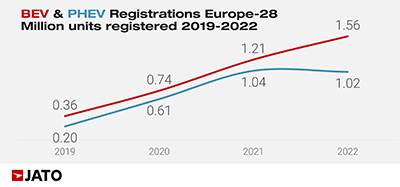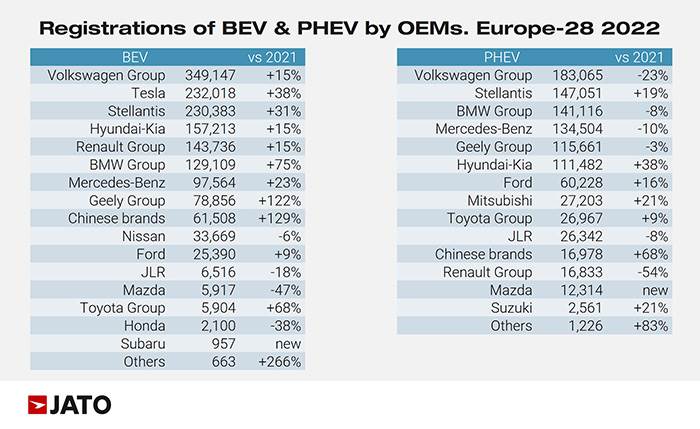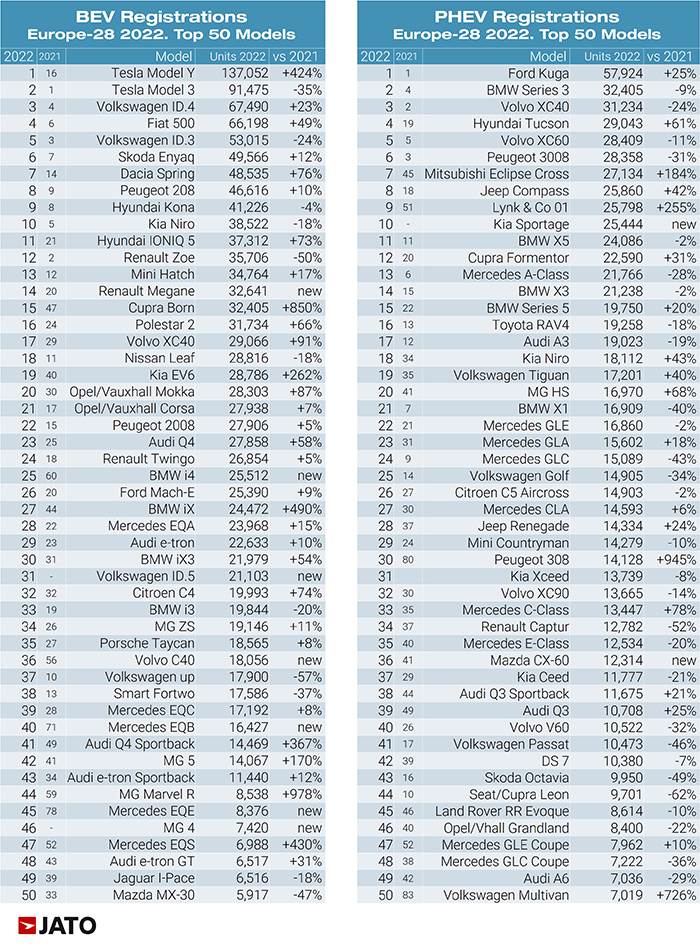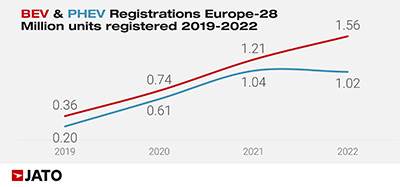In 2022, registrations of electrified vehicles (BEV, PHEV, EREV, FCEV) in Europe reached a new record with a total of 2.59 million units. Year-on-year, volume increased by 15%, and by 92% when compared with 2020. In 2019 – before the Covid-19 pandemic hit European markets – registrations totalled 561,000 units, however the market share for EVs has grown from 3.6% to 23% last year – a volume increase of 362%.
Felipe Munoz, Global Analyst at JATO Dynamics, commented: “The rapid growth in demand for EVs is the consequence of continued government support through incentives, and a shift in consumer sentiment thanks to increasing awareness around the available product offering.”

Last year, BEVs (Battery Electric Vehicles) or pure electric vehicles accounted for 60% of all EV registrations. While registrations of PHEVs (Plug-in Hybrid Electric Vehicles) declined, BEVs recorded a 29% increase between 2021 and 2022 to a total volume of 1.56 million units – a new record for the European market. Almost 14 out of every 100 new cars registered in Europe last year were powered by a pure electric powertrain.

The leading countries in terms of BEV market share were Norway (79%), Sweden (33%), Netherlands (23%), and Denmark (21%), followed by Finland, Switzerland, and Germany – each with 18%. Looking at market share variation, the most significant growth was in Norway (+16 points), Sweden (+14p), Finland (+7.5p), Denmark (+7.3p), and Ireland (+6.7 points). Italy (-0.9 points) was the only market to see a decline between 2021 and 2022.
Volkswagen Group tops BEV market
In 2022, Volkswagen Group led the BEV market with sale of 349,200 units and a market share of 22.4%. This is thanks to strong demand for Volkswagen’s electric SUV offering and the Cupra Born. Despite this, the German manufacturer was unable to gain market share due to the poor performance of the ID.3 and the discontinuation of the e-up. In 2022, Volkswagen lost almost 3 market share points to Tesla, Stellantis, BMW Group, Geely Group, and several Chinese carmakers. Meanwhile, despite a 35% drop in registrations of the Model 3 – Europe’s best-selling BEV in 2021 – Tesla saw a volume increase of 38%, outselling Stellantis to secure second place in the BEV ranking by OEM. Tesla’s strong showing was due to demand for the Model Y which topped the ranking by model in nine European markets, while the Model 3 led in three.
Stellantis also gained market share thanks to the performance of the Fiat 500 and Opel/Vauxhall Mokka. BWM Group saw a 75% increase in volume as a result of strong demand for the i4 and iX, outselling rival Mercedes-Benz that was impacted by a decline at Smart. Geely (owner of Volvo and Polestar) and China’s OEMs saw BEV registrations more than double between 2021 and 2022. The results of the former were driven by stong demand for the Polestar 2, Volvo XC40, and Volvo C40 in Sweden, Norway, Germany, and the UK. Of China’s carmakers operating in Europe, MG accounted for the majority of new vehicle registrations (80%) with an increase of 111% to 49,200 units.
Europe’s best-selling BEVs
Tesla led the overall ranking by model with the Model Y and Model 3. Sales of Tesla’s SUV exceeded 137,000 units, while the US EV maker registered 91,500 units of its sedan, down 35% YoY – sales of the Model 3 totalled 141,400 units in 2021. The success of the Model Y came at the expense of the Model 3 due to the increasing popularity of SUVs which accounted for 51% of total BEV registrations. The same trend was seen in the case of Volkswagen’s ID.3 (hatchback), and ID.4 (SUV) – while registrations of the ID.4 increased by 23%, registrations of the ID.3 declined by 24%.
The Fiat 500 secured fourth place in the ranking by model with a 49% increase in registrations thanks to strong demand in Germany and France – its largest markets. The electric version of the 500 represented 37% of the model’s total registrations. Other strong performers include the Dacia Spring (+76%), Hyundai Ioniq 5 (+73%), and the Polestar 2 (+66%). Among the latest launches, Renault registered 32,600 units of the electric Megane (46% of its total); Cupra registered 32,400 units of the Born; BMW registered 25,500 units of the i4; Volkswagen registered 21,100 units of the ID.5; Volvo registered 18,100 units of the C40; and Mercedes registered 16,400 units of the EQB.

